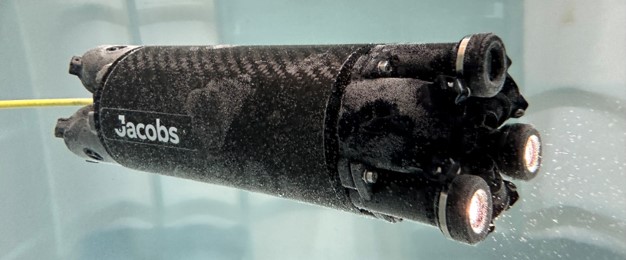What Can We Learn From Each Other? How Robotic Solutions Can Transfer From Sector to Sector
Interested in the future of autonomous robots?
Click here to join techUK's Future Visions webinar, on 11 December, to learn about:
- the latest autonomous robot technologies
- areas for further Government support, and
- opportunities for UK industry to develop or adopt the tech
By Professor James Kell, Robotics Technical Director at Jacobs
Robotics systems are transformative tools that can transcend industry boundaries and enhance safety and efficiency in challenging environments. They are often described as the physical embodiment of artificial intelligence (AI) with the potential to change lives for the better. But how can we ensure that the benefits are realised across as many sectors as possible?
Once particular area of focus – and one that the UK already excels in – is the use of robots in areas that are too difficult or too dangerous for humans to access. The safest way to perform a task is by not being in danger, so the use of robotic and remote handling tools substantially increases the level of protection for inspection and maintenance operators.
Sadly however, good practice in some areas has not transferred into others for technological reasons or because of specific industry cultures and working practices, such as the tendency to quickly dismiss a suggestion as ‘not invented here’, or simply a lack of awareness about developments in this rapidly moving field.
However, there have been plenty of examples of inventions being successful in areas for which they were not designed. For example, freeze-dried food, foil blankets, and even wireless power tools are all developments that were funded by the NASA Apollo program in the 1960s but are all in wide circulation today. It seems likely that these inventions were able to be publicised and the benefits widely understood for multi-sector adoption to take place.
At Jacobs, we are fortunate to work in a variety of sectors, so we can cross these boundaries internally and externally. For instance, we have recently taken robotic solutions designed and deployed in nuclear decommissioning and put them to use in sub-surface culvert inspection and marine harbour inspection. No modifications were required, the most difficult aspect was finding the right stakeholders and ensuring they were aware of the capabilities of the equipment. There was no need to ‘sell’ a benefit in these instances; the application was being driven by the problem owners because they were aware that the capabilities existed and were incentivised to use them.

MicroROV. ø72mm x 232mm, 6DoF remote control mini submersible, with onboard GPU and CPU, used to produce 3D scene reconstruction
In order to at least maintain the UK’s leading position in the application of robotics in high value and high integrity sectors, we need to ensure that we are promoting our successes, wherever they arise, so that others can adopt them in ways we never imagined. In addition, we also need to create areas where industry challenge owners can share issues and obtain state of the art guidance on what is possible from a technological standpoint - the gap between science fiction and reality is a growing obstacle too!
The government can also support us by encouraging standardisation and assisting its regulators. Presently, there is no unified approach on how to regulate the appropriate and safe use of robotics and AI. When the use of software became widespread in the 1970s/80s, it is easy to imagine similar sorts of challenging questions being posed at regulatory bodies and similar debates taking place. Can we look back for any lessons from history?
One initiative that offers a place for challenge owners to see current examples – and to adapt and deploy solutions from other sectors – is CRADLE (The Centre for Robotic Autonomy in Demanding and Long-lasting Environments). Partly funded by the Engineering and Physical Sciences Research Council (EPSRC), this is a partnership between Jacobs and the University of Manchester. Alongside a set of core research themes, CRADLE offers industry sprints where the team will seek out a solution to a challenge with modular elements drawn from existing systems, thereby promoting cross-sector fertilisation.
Another good example of is the UK:Robotics and Autonomous Systems network – with EPSRC funding - creating the Cross-Industry RAS Development Task Force project. This has already resulted in the formation of its first committee on Regulations Standards and Ethics.
Society needs to see more benefits from AI and robotics (if only by association). Only by showing these applications in a positive light can we revolutionise safety and efficiency across industries, encouraging continued collaboration and innovation in this field and fostering a community that can share ideas across different sectors.
techUK – Unleashing UK Tech and Innovation
The UK is home to emerging technologies that have the power to revolutionise entire industries. From quantum to semiconductors; from gaming to the New Space Economy, they all have the unique opportunity to help prepare for what comes next.
techUK members lead the development of these technologies. Together we are working with Government and other stakeholders to address tech innovation priorities and build an innovation ecosystem that will benefit people, society, economy and the planet - and unleash the UK as a global leader in tech and innovation.
For more information, or to get in touch, please visit our Innovation Hub and click ‘contact us’.
Latest news and insights
Other forms of content
Sprint Campaigns
techUK's sprint campaigns explore how emerging and transformative technologies are developed, applied and commercialised across the UK's innovation ecosystem.
Activity includes workshops, roundtables, panel discussions, networking sessions, Summits, and flagship reports (setting out recommendations for Government and industry).
Each campaign runs for 4-6 months and features regular collaborations with programmes across techUK.
techUK's latest sprint campaign is on Robotics & Automation technologies. Find out how to get involved by clicking here.
Running from September to December 2023, this sprint campaign explored how the UK can lead on the development, application and commercialisation of space technologies, bring more non-space companies into the sector, and ultimately realise the benefits of the New Space Economy.
These technologies include AI, quantum, lasers, robotics & automation, advanced propulsion and materials, and semiconductors.
Activity has taken the form of roundtables, panel discussions, networking sessions, Summits, thought leadership pieces, policy recommendations, and a report. The report, containing member case studies and policy recommendations, was launched in March 2024 at Satellite Applications Catapult's Harwell campus.
Get in touch below to find out more about techUK's ongoing work in this area.
Event round-ups
Report
Insights
Get in touch
Running from January to May 2024, this sprint campaign explored how the UK can lead on the development, application and commercialisation of the technologies set to underpin the Gaming & Esports sector of the future.
These include AI, augmented / virtual / mixed / extended reality, haptics, cloud & edge computing, semiconductors, and advanced connectivity (5/6G).
Activity took the form of roundtables, panel discussions, networking sessions, Summits, and thought leadership pieces. A report featuring member case studies and policy recommendations was launched at The National Videogame Museum in November 2024.
Get in touch below to find out more about techUK's future plans in this space.
Report
Event round-ups
Insights
Get in touch
Running from July to December 2024, this sprint campaign explored how the UK can lead on the development, application and commercialisation of web3 and immersive technologies.
These include blockchain, smart contracts, digital assets, augmented / virtual / mixed / extended reality, spatial computing, haptics and holograms.
Activity took the form of roundtables, workshops, panel discussions, networking sessions, tech demos, Summits, thought leadership pieces, policy recommendations, and a report (to be launched in 2025).
Get in touch below to find out more about techUK's future plans in this space.
Event round-ups
Insights
Get in touch
Running from February to June 2025, this sprint campaign is exploring how the UK can lead on the development, application and commercialisation of robotic & automation technologies.
These include autonomous vehicles, drones, humanoids, and applications across industry & manufacturing, defence, transport & mobility, logistics, and more.
Activity is taking the form of roundtables, workshops, panel discussions, networking sessions, tech demos, Summits, thought leadership pieces, policy recommendations, and a report (to be launched in Q4 2025).
Get in touch below to get involved or find out more about techUK's future plans in this space.
Upcoming events
Insights
Event round-ups
Get in touch
Campaign Weeks
Our annual Campaign Weeks enable techUK members to explore how the UK can lead on the development and application of emerging and transformative technologies.
Members do this by contributing blogs or vlogs, speaking at events, and highlighting examples of best practice within the UK's tech sector.




























































